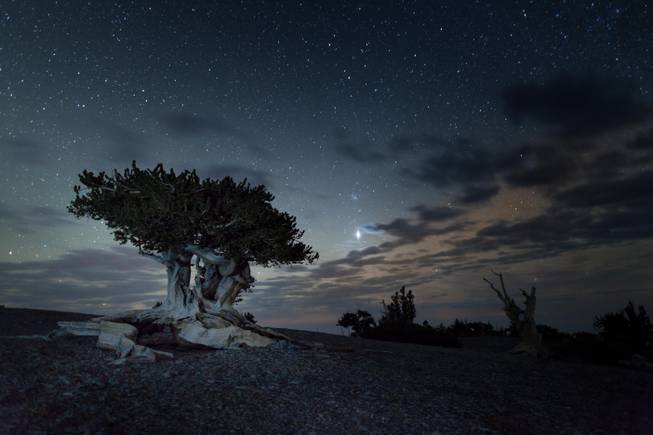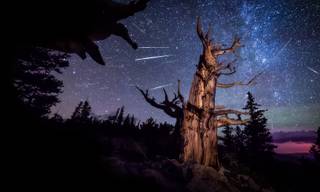
Courtesy of NPS
A bristlecone pine in Great Basin National Park.
Thursday, Sept. 17, 2015 | 2 a.m.
The 60-foot laser beam streaked like a lightsaber across the night sky, playing connect-the-dots with constellations in the plane of the Milky Way.
On a hillside 300 miles northeast of Las Vegas in Great Basin National Park, Derek Demeter controlled the light with shifts of his wrist. Each movement sent the laser on a light-years’ long course.
It was 10 p.m. on a recent weekend and 300 park guests craned their necks toward the heavens. Some peered through telescopes and others followed the vivid path of Demeter’s wand. Faces weren’t visible, but the stars, the Milky Way and distant galaxies were.
Demeter shined his light on the constellation Cygnus, highlighting the mythological swan’s wings — and a time when the sky was calendar, entertainment and spiritual guide.
One dot in the group was Orpheus, a musician eternally playing his lyre among the stars.
Demeter, a short, quick-witted man who runs the planetarium at Seminole State College in Florida, does not over-philosophize when describing the galaxy, comparing the Greek mythological figure to Eddie Van Halen and saying Earth was in the “suburbs of the universe.”
But don’t look at the sky and feel infinitesimal, he said. “There are more neurons in human brains than stars in the universe. We’re not small.”
In an era when dark skies are increasingly hard to find — especially in light-drenched Las Vegas — Demeter and Great Basin are reviving an age-old activity: watching the night sky.
Last weekend, more than 1,000 visitors trekked to the Great Basin for its sixth annual Astronomy Festival. Kelly Carroll — known as the park’s dark ranger — started it to bring more visitors and to expose them to something few have a chance to see.
“For almost all of human existence, we’ve been under a starry sky,” he said. “It’s only been in the last 100 years where that’s not the case.”
On a map of light pollution in the United States, Great Basin stands out as a black hole surrounded by a ring of light: Las Vegas, Los Angeles, San Francisco, Portland, Boise and Salt Lake City. Located along the Nevada-Utah border, the national park’s skies are among the darkest on Earth.
Through telescopes, park-goers saw a visual buffet of up-close galaxies, planets and stars, marveling at a sky that’s 100 times clearer than it would be above the average city. In a way, they gazed into a mirror. The carbon and calcium in stars make up the human body.
“When we look at the skies,” said Carroll, “we look at ourselves.”
National parks don’t often lend themselves to nightlife. But the Milky Way, Andromeda and Saturn have won the adoration of park-goers at Death Valley, Big Bend, Denali and Arcadia. The mountains, caves and glacial moraines are worth the visit to Great Basin, the lone national park completely within Nevada. But as park rangers point out, half the park’s allure is after dark.
Astronomers such as Demeter and telescope makers from optics company Celestron camped out, but amateur enthusiasts made up the majority of attendees, many bearing license plates from Florida, Wyoming, Oregon, Virginia, Missouri and Michigan.
Barry Schrock made the five-hour drive from Las Vegas with a telescope that cost $12,000 less than the most expensive one at the festival. He bought it at a garage sale years ago and was considering dumping it, but experts there helped him fix it up. Through the lens, he had a clear view of Ursa Major, a pair of galaxies 330,000 light years from Earth. He also focused on Triangulum, a spiral galaxy that’s 2.3 million light years away.
What’s the secret to Great Basin’s overwhelming view? Schrock answered, “Dark sky, dark sky, dark sky.”
Kyle Roerink can be reached at 702-259-4061 or [email protected] Follow Kyle on Twitter at twitter.com/KyleRoerink1


Join the Discussion:
Check this out for a full explanation of our conversion to the LiveFyre commenting system and instructions on how to sign up for an account.
Full comments policy